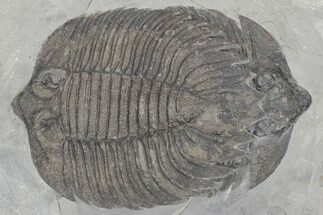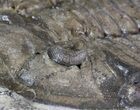This Specimen has been sold.
2.8" Dalmanites Trilobite - New York
This is a 2.8" long specimen of the classic New York, Silurian trilobite Dalmanites limulurus. It was collected from the famous Caleb's Quarry near Middleport, NY. It's quite large for the species and centered on a nice piece of shale. Like nearly all specimens from this quarry there is some shell restoration along the repaired cracks but it's pretty minor, about 2%.
About Dalmanites
Dalmanites is a very visually striking trilobite is one of the classic North American fossils. The distinctive compound eye, believed to be a stereoscopic motion detector, had lenses made of rigid crystal. Its armor, spikes, and visual acuity imply that Dalmanites was trying to keep itself off the menu.
The genus Dalmanites thrived across the globe in a variety of sea conditions and climate. It scanned the Ordivician (488-443 mya) and Silurian (444-415 mya) seas with the good depth perception of its shizochroal eye. Bony and jawed fish emerged in the Silurian, forcing trilobites to adapt or die in a greenhouse world of growing reefs and diverse predators.
The unique shizochroal adaptation of the suborder Phacopina is characterized by up to 700 relatively large, thick lenses made of the purest calcite. A doublet system of mounted lenses within the eye reduced distortion, while perched eyes promoted a wide field of view.
Caleb’s Quarry of Middleport, New York, which quarries the Rochester Shale, is the primary source of richly detailed and well-preserved Dalmanites limulurus as well as over 200 other species that tell the ecological story of the Early Silurian. The famous shale is made from the relic Appalachian Mountains that were uplifted and eroded away into the shallow but deepening, warm seas of the Atlantic.
While the rocks around Lockport, New York have been worked for trilobites since the 1830s, the opening of Caleb's Quarry in 1991 has significantly added to the quantity and quality of the material available. This quarry spends much of the year under water, making work there unquestionably difficult. Many hours of detailed preparation work are required under microscope to extract and repair the trilobites found there.
Dalmanites is a very visually striking trilobite is one of the classic North American fossils. The distinctive compound eye, believed to be a stereoscopic motion detector, had lenses made of rigid crystal. Its armor, spikes, and visual acuity imply that Dalmanites was trying to keep itself off the menu.
The genus Dalmanites thrived across the globe in a variety of sea conditions and climate. It scanned the Ordivician (488-443 mya) and Silurian (444-415 mya) seas with the good depth perception of its shizochroal eye. Bony and jawed fish emerged in the Silurian, forcing trilobites to adapt or die in a greenhouse world of growing reefs and diverse predators.
The unique shizochroal adaptation of the suborder Phacopina is characterized by up to 700 relatively large, thick lenses made of the purest calcite. A doublet system of mounted lenses within the eye reduced distortion, while perched eyes promoted a wide field of view.
Caleb’s Quarry of Middleport, New York, which quarries the Rochester Shale, is the primary source of richly detailed and well-preserved Dalmanites limulurus as well as over 200 other species that tell the ecological story of the Early Silurian. The famous shale is made from the relic Appalachian Mountains that were uplifted and eroded away into the shallow but deepening, warm seas of the Atlantic.
While the rocks around Lockport, New York have been worked for trilobites since the 1830s, the opening of Caleb's Quarry in 1991 has significantly added to the quantity and quality of the material available. This quarry spends much of the year under water, making work there unquestionably difficult. Many hours of detailed preparation work are required under microscope to extract and repair the trilobites found there.
SPECIES
Dalmanites limulurus
LOCATION
Caleb's Quarry, Middleport, New York
FORMATION
Rochester Shale
SIZE
2.8" long
CATEGORY
SUB CATEGORY
ITEM
#42679
We guarantee the authenticity of all of our specimens.
 Reviews
Reviews














